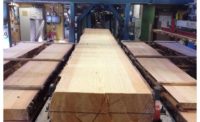A U.S-Canada agreement aimed at resolving a lengthy trade dispute over Canadian exports of softwood lumber was praised by federal government officials and U.S. lumber producers, but criticized by U.S. home builders.
The deal, announced April 27, puts no quotas, tariffs or other restrictions on Canadian lumber shipments to the U.S. under current market conditions, both sides say. If the lumber market weakens, Canadian lumber producers would pay export taxes that would be adjusted as prices decline, according to the U.S. Trade Representative's office. USTR adds that Canadian provinces could decide to reduce these export taxes by cutting exports below recent levels.
 |
| Canadian Prime Minister Harper announces agreement (Photo courtesy of Office of Canadian Prime Minister) |
Canada adds that at least $4 billion in duties collected by the U.S. would be paid to Canadian lumber producers. U.S. lumber companies also would get a share of the duties. Bill Graham, head of the Canadian opposition party, estimates the U.S. companies share at $500 million.
In its most recent review of duties, the U.S. Commerce Dept. last December set a rate of 8.7%, down from 16.4%. Canada challenged that duty.
The agreement, which would extend for seven years, also calls for ending all litigation.
Canadian Prime Minister Stephen Harper said, "It's a good deal that resolves this long-standing dispute and allows us to move on."
U.S. Trade Representative Rob Portman said the agreement would end litigation that stretches back more than 20 years. "After multiple lawsuits without resolution," Portman adds, "we are now close to achieving what many thought would never happen. There are still a few details to be finalized, but we've worked hard to shape a smart, market-based solution."
 |
| USTR Portman says deal would end years of lawsuits (Photo courtesy of Office of U.S. Trade Representative ) |
A group of U.S. lumber producers, the Coalition for Fair Lumber Imports, hailed the news of the pact, which coalition Chairman Steve Swanson described as "balanced and fair."
But the National Association of Home Builders criticized the deal. Jerry Howard, NAHB executive vice president and CEO, said in an April 26 statement that the envisioned Canadian export tax "would raise lumber prices and create significant volatility in the marketplace."
Howard added, "For an administration that espouses free trade, there is no logical reason to ignore repeated NAFTA rulings and to engage in one-sided negotiations that would provide a massive subsidy to the U.S. timber industry at the expense of millions of American consumers."
NAHB says that lumber imports from Canada now represent about one-third of U.S. consumption.
In Canada, Liberal Party leader Graham slammed the agreement as "a disaster for Canada, for free trade and for the Canadian lumber industry."

